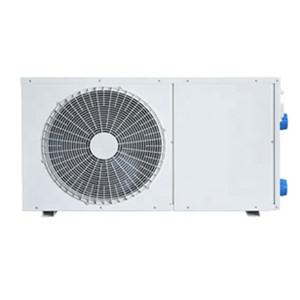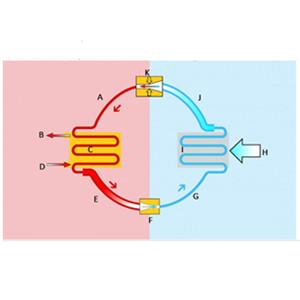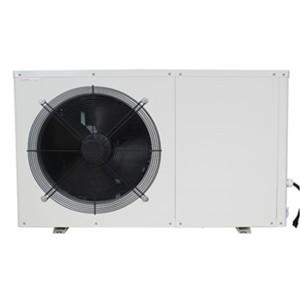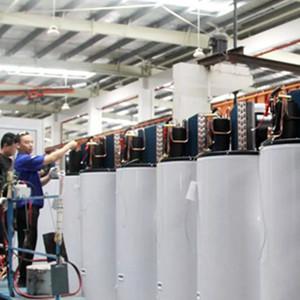Best Air Source Heat Pump Manufacturers
A heat pump is a type of HVAC (heating, ventilation and air conditioning) system. They transfer heat from one place to another using electricity.
It can be seen that the heat pump market is experiencing significant growth internationally. This is due to increased demand and support from government policies in many countries.
You will find many top players in the global heat pump market. Here, we’ll take a look at the best heat pump brands and manufacturers.
We will also explain the definition and functions of a heat pump and explore its different types. Finally, we’ll also dive into how to choose the right heat pump for your home or business.
So let's explore everything.
What is a heat pump?
A heat pump is a central integrated cooling and heating system. Similar to an air conditioner, it cools your home. On the other hand, it also provides heat.
This means that the heat pump operates in both summer and winter. In the summer, it uses refrigerant to absorb heat from the room. The system's compressor then releases the heat to the outdoors.
In the winter, a heat pump works like a heater. During the colder months, it uses refrigerant to extract heat from the outdoors. It's then moved indoors, so it works in reverse.
The heat pump uses a reversing valve to switch from cooling to heating mode. In the colder months, a heat pump does this. Even if it's cold outside, there's enough heat in the outdoor air to provide warmth.
Heat pumps pump cold or warm air from one place to another. So they use electricity to do that. They do not burn fossil fuels (especially natural gas) to generate heat. This makes the heat pump an energy-efficient and environmentally friendly device.
Different types of heat pumps
There are three main types of heat pumps. They work on the same principle, they just draw heat from different sources.
Let’s look at them one by one:
1. Air source heat pump
Air source heat pumps are also called air-to-air heat pumps. They extract heat from the outdoor air and transfer it to the home. They are relatively cheap, are the easiest heat pumps to install, and take up less space.
If installed correctly, air source heat pumps can provide efficient cooling and heating for your home. They are one of the top heat pumps for residential use.
2. Water source heat pump
A water source heat pump is a cooling and heating system. It extracts thermal energy from water sources such as lakes, rivers, ponds, and mine water. It does this even if the water temperature is lower than the required air temperature in the room.
Water source heat pumps are suitable for homes and businesses located near a water source. They are also sustainable and energy efficient and can be installed in different buildings.
Water source heat pumps and air source heat pumps work similarly, but the former uses water instead of air to extract and release heat.
3. Geothermal heat pump
Geothermal heat pumps are one of the most energy-efficient ways to cool and heat buildings. Geothermal heat pumps are also known as ground source heat pumps.
Like other heat pumps, they draw and release heat into the room. But they do not exchange heat with outdoor air. Instead, they take advantage of the constant temperatures 6 feet underground. The average temperature here is 55 °F.
Underground temperatures are typically warmer than winter air temperatures. This is why geothermal heat pumps are more efficient, especially in the winter.
This type of heat pump is quieter and more reliable than air source heat pumps. However, geothermal heat pumps are not popular due to their higher installation costs.
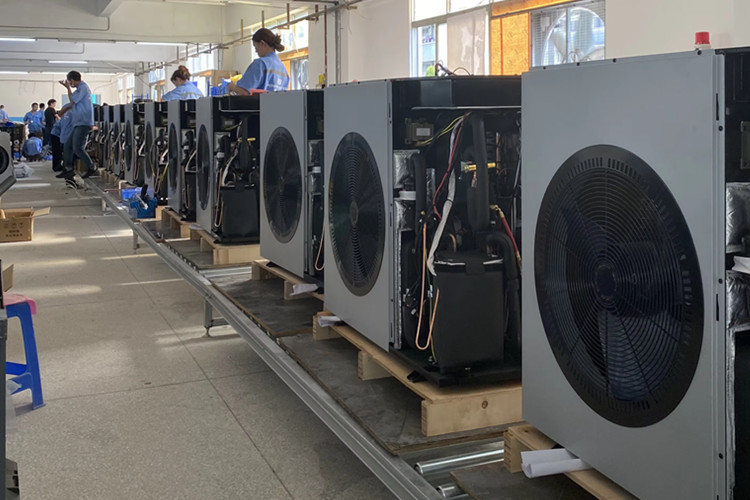
11 Best Heat Pump Brands and Manufacturers
1. Carrier
Carrier is one of the most trusted heat pump companies. It is a multinational HVAC systems supplier headquartered in Florida, USA.
As you can see, Carrier offers a wide variety of heat pumps. It also recently launched a new range of heat pumps. It meets the U.S. Department of Energy’s 2023 minimum efficiency requirements. Carrier heat pumps are known for working efficiently and silently.
In addition, Carrier owns more than 75 leading brands, including Logic, CIAT and Bryant.
Willis Carrier founded the Carrier Engineering Company in 1915. He is considered the inventor of modern air conditioning.
2. Goodman
Goodman is a brand of HVAC systems, including heat pumps. It is a division of Daikin Group, the largest manufacturer of HVAC systems.
Harold V. Goodman founded Goodman in 1975 in Houston, Texas, USA, and the company is headquartered at the Daikin Texas Technology Park near Houston.
Reviewers praise Goodman heat pumps for being energy-efficient, reliable, and able to function even in adverse weather conditions. Goodman equipment lasts long and requires minimal maintenance. They also help reduce energy bills while improving indoor comfort.
3. Leomon
Leomon is one of the major heat pump manufacturers in China.
Founded in 2005, Leomon has over 20 years of experience manufacturing heat pump solutions. It is known as one of the best air-to-water heat pump manufacturers.
The product series produced by the company are extremely competitive and have received wide acclaim in China and even around the world.
These include:
*House heating/cooling heat pump
* Heat pump water heater
* Swimming pool heat pump
* Heat pump dryer
The company is headquartered in Ma'anshan, China.
4. Lennox
Lennox is one of the best heat pump brands as of 2024.
The strengths of the Lennox brand are efficiency, quality and peace of mind. Its heat pumps have some of the best efficiency ratings. Its products are durable and reliable, which means long service life and minimal repairs.
Lennox operates in more than 70 countries with manufacturing facilities in the United States, India, Germany and elsewhere. The company was founded in Iowa, USA, in 1895 and is headquartered in Richardson, Texas, USA.
Lennox heat pumps are known for their quiet operation. They also come with a warranty of about 20 years, depending on the model.
5. Amarna
Amana is an American brand that manufactures HVAC products, including heat pumps. Its products are considered quiet, energy-efficient, cost-effective and meet high standards.
Additionally, select Amana heat pump models come with ComfortNet technology. It is a communication technology that allows users to control every aspect. These include using a mobile app to adjust your heat pump system.
Amana places a high value on American pride. That's why its products, including heat pump systems, are made in the United States.
The company was founded in 1934 in Mid-Amana, Iowa, USA. Currently, its headquarters are located in Newton, Iowa.
6. Coleman
Coleman is a major player in the HVAC industry. It provides reliable and cost-effective products such as heat pumps. The company offers one of the best product warranties, including a money-back guarantee.
Coleman was founded in 1900. Meanwhile, Coleman Heating and Air Conditioning was founded in 1958 as part of the Coleman Company. It was founded in Wichita, Kansas, USA, and is headquartered where it is today.
Additionally, the company was acquired by Johnson Controls in 1996. The company also acquired York. Coleman HVAC products are made in the USA.
7. Trane
Trane was founded in 1913 in La Crosse, Wisconsin, USA as The Trane Company. Currently, the company is one of the best heat pump manufacturers.
The company's heat pumps offer reliability and remain a wide choice among homeowners. Although expensive. Reviewers praise the quality of Trane heat pumps as the highest available.
The company offers a unique range of heat pump models to suit a variety of needs. Trane is headquartered in Dublin, Ireland. But it also has operations in North Carolina, US.
The company's heat pumps come with a standard 10-year warranty. Some units also come with a 12-year extended warranty on the compressor.
8.Rheem
Rheem is undoubtedly one of the top heating manufacturers in the world. The company operates in more than 80 countries and is headquartered in Atlanta, USA.
Rheem makes affordable HVAC equipment that is durable and energy efficient. The products are also compatible with its app, Amazon Alexa and other voice assistants.
Reviewers praise the manufacturer for the quality of its products. Founded in 1925, this American company makes heat pumps that operate reliably and quietly.
9. Bryant
Bryant is an inexpensive brand in the HVAC industry. It's owned by Carrier, the company we discussed earlier. Other than the exterior cabinets, the Carrier and Bryant products are nearly similar.
Note that Bryant heat pumps are 5-15% less expensive than Carrier. This makes Bryant heat pumps a more affordable option. As one of the top heat pump brands, its products are versatile, energy-efficient, and quiet.
Bryant Corporation was founded in Cleveland, Ohio, in 1904, and merged with Carrier Corporation in 1955.
10. York
York is an American heat pump brand founded in 1874. It is a well-known brand in the HVAC industry and produces a variety of products.
Experts say the company's equipment, including heat pumps, are affordable and of high quality. The company also offers a standard warranty. It has a 10-year parts warranty and a 1-year labor warranty.
York was founded in York, Pennsylvania, USA. It is a brand of Johnson Controls. It was acquired by Johnson Controls in 2005. The company's products are produced in North America.
York products are used in many famous buildings around the world. For example:
Empire State Building (USA)
Sydney Opera House (Australia)
11. Daikin
Founded in 1924, Daikin is considered the global leader in heat pump systems. Its headquarters is located in Osaka, Japan.
The company operates in more than 160 countries:
Europe
Africa
Asia
North America
The company has installed around 1.2 million hot water pumps in Europe since 2006. The company manufactures a range of heat pumps and is committed to providing quality products.
The company is investing in increased production capacity to meet growing global demand for heat pumps. The company also plans to further increase its manufacturing capabilities. These include the production of 1 million water heat pumps per year by 2025.
How do I choose the right heat pump for my home or business?
You may consider installing a heat pump to regulate your home or commercial premises. Therefore, this is a great way to increase energy efficiency. Please note that heat pumps are not the right system for every home or business. However, there are some notable factors to keep in mind before choosing a heat pump.
Some of them are:
1. Assess the building’s energy needs
The first important factor you need to remember is to assess your building’s energy needs. When considering this, consider parameters such as size, efficiency, and space.
For example, consider a 2,000 square foot home or office. It may require a 40,000 BTU (British Thermal Unit) heat pump. That is, it would require approximately a 3.5 ton size heat pump.
Typically, heat pumps must achieve 20 BTUs per square foot of living space. Most heat pumps are available in sizes from 1 to 5 tons.
Large buildings may require geothermal heat pumps due to their high thermal energy requirements. In new buildings, air source heat pumps are more economical than water source heat pumps.
Also, choose a model with a higher SEER (Seasonal Energy Efficiency Ratio). A higher SEER value means the heat pump uses less energy.
2. Consider location and climate conditions
Before choosing a heat pump, consider location and climate conditions.
Although heat pumps are designed to work well in most areas, some models perform better. Especially in areas that experience specific weather patterns.
For example, you might live somewhere with harsh winters. In this case, choose a model with a higher seasonal coefficient of performance (SCOP) rating. It specifies better performance, especially in cold temperatures.
Note that air source heat pumps generally perform well in moderate climates. On the other hand, water source and geothermal heat pumps perform better in harsher conditions.
3. Choose the right type of heat pump
A specific type of heat pump may not be right for your home or business. Therefore, choosing the right type of heat pump is also crucial.
Air source heat pumps are suitable for smaller homes or businesses in urban areas and are appropriately insulated. In contrast, geothermal heat pumps are suitable for homes or businesses with larger surrounding areas. They also require more installation space.
We also need to consider water source heat pumps. Businesses and homes located near bodies of water (ideally within 100 meters) will find them suitable. You should also have access to the water source for your heat pump. This type of heat pump is also quite expensive to install.
4. Reflect on initial investment and long-term operating costs
When choosing a heat pump, consider the initial investment and long-term operating costs.
Note that heat pumps cost between $4,000 and $8,000. This includes unit price, labor and other required equipment. On average, the cost to install a new heat pump is approximately $6,500.
Large energy-efficient heat pumps can cost up to $14,300, including labor and materials. The more energy efficient a heat pump is, the higher the upfront price will be. Therefore, it ultimately lowers your utility bills.
Heat pump systems typically require little maintenance. Maintenance costs approximately $75-$300 per year. If you maintain your heat pump properly, your energy bills will be lower.
5. Consider the reputation of the brand and manufacturer
When researching different models of heat pumps, also consider the reputation of the brand and manufacturer.
Choose a brand or manufacturer that offers at least a 10-year warranty. This warranty should also come with excellent customer service.
You can choose from well-known brands like Carrier, Daikin, and Lennox. All these brands offer a warranty of over 10 years. These brands have a proven track record of producing high-quality and reliable products.
After research, you may find an ideal heat pump that meets your requirements. Then, hire a reputable contractor in your area. Keep in mind that they should be able to install that specific heat pump model.
Additionally, few HVAC companies are factory-authorized dealers for a specific brand. However, they will not install other brands of heat pumps.
FAQ
What is the lifespan of a heat pump?
Heat pumps are built to last. In the past, their average lifespan was about 15 years. Due to recent technological developments, modern heat pumps have a lifespan of about 20-25 years before they need to be replaced.
This depends on a variety of factors, such as model, brand or manufacturer, maintenance, etc.
Are there incentives for heat pumps?
There are more than 30 countries that offer incentives for heat pumps. A rough estimate is that these cover more than 70% of global heating needs. Some countries offer subsidies in the form of grants, while others use tax credits.
For example, the United States has many incentives for heat pumps. These include:
State tax rebates
Federal tax credits

